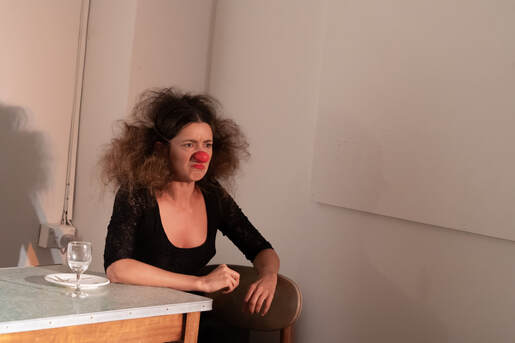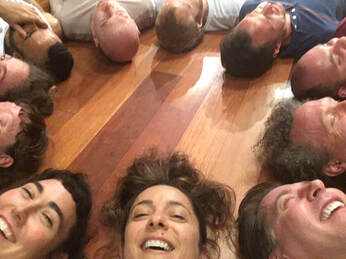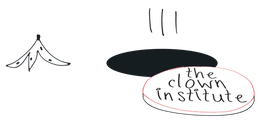|
Clowning is in the heart business, not only does it help heighten our immune system it can also make the heart stronger, plus the clown can touch our hearts too. A clown is to be your heart on stage, whether that be the stage of life or a theatre. Sometimes we go through experiences that feel too large or significant for words to fully capture, and that is where art, our hearts, and clowning becomes useful; we go to humour, symbols, and imagery to tell our stories. Isn't that wonderful? When I first set out to put together the Clown & Melodrama workshop back in late 2019, it was born out of curiosity and desire to express my despair and to find a playful way to transform that heartbreak into physical comedy. My questions were: what's the most fun way to create clown performances from these identifiable life moments and personal struggles, and secondly could these clown performances inspire laughter, hope, and healing in others?
In devising the workshop, I decided to review my time as a student at the Jacques Lecoq school, combining principles (or provocations) from subjects we learned like melodrama, tragic chorus, and clown. I wanted to understand how best to take an audience on a pathos-fuelled journey, via tears and laughter. I remembered the work we did in the first year exploring music and the counter mask where we moved the opposite way, or against the rhythm of a musical composition. As students writhing around to the music, we'd find an absurdity – a kind of sense in the nonsense. So, I mused why not apply this similar counter mask idea to create a clown logic that reverses the audience's expectations and that could potentially tug at the heart too. I found that we can take a very serious subject like the separation of a couple and observe how the clown subverts this situation by playing against it, by using an opposite expected rhythm. The improvisation plays out like this: The clown arrives home from a long day of work and hustling to find their spouse (played by an actor in realism) furiously packing and stuffing their personal belongings into a suitcase. The most obvious reaction is for the clown to play sadness or rage. This would be the boring choice and as the audience yes, we'd feel pity for the clown but would we be transformed, is this going to tickle our funny bone and make us love the clown? My guess is - not really. But what if the clown were to walk in, pause and observe their spouse packing, suddenly change their rhythm by excitedly grabbing their dusty suitcase, snorkel gear, and beach towel under the notion that they were together going on a romantic getaway. To add insult to injury, we then hear a knock at the door and the clown's spouse greets a stranger with a passionate embrace and kiss. The clown, stunned and wide-eyed now chooses an unexpected rhythm hurriedly walks up to the stranger shakes their hand, and offers them a generous tip, mistakenly believing the new lover is the cab driver that will drive them to the airport. It is 200% more fun and surprising for the clown, your scene partner, and the audience when we get to play against the obvious and alternate the expected rhythms. Here we can access vulnerable states, paradoxes, and reversal of order which benefits the clown enter into a playful tragic realm. It removes all sentimentality so it is the audience who does the work of feeling (the gooey heart stuff) and this can hopefully lead to transformation. What is the transformation? In this scenario it is about us, the audience, connecting to the fool's misunderstanding. Around the world, we're all fractured and socially disconnected. In clowning and clown training we can engage laughter and play in direct action towards social justice, to alleviate pain and suffering, and to remind us of our humanity. The clown's role in theatre or social contexts has become clearer to me over time; they're the guiding light of hope. They're the eternal dreamer showing us the way that with every human disaster there's an opportunity to create a space for connection, to experience empathy. The Clown and Melodrama workshop aims to access a playful dimension to our human tragedies. Day one of the workshop is focused on the journey of the emotions and opening the clown's heart first because before we can begin to perform 'heart surgery' on others to some degree we must be prepared to access our vulnerable states and stories first. Day two of the workshop is then dedicated to improvisation and games around how the clown can stay optimistic despite a terrible situation, as well as devising clown creations. It's easy to be playful and laugh when we are feeling good, but it is when the world seems bleak that we need to laugh the most in our lives. Our laughter then echoes in the chambers of our hearts, filling the empty spaces with pure joy and fun. We all want to be more authentic and present. But how does one harness these qualities? Whether in everyday life, or as an actor playing a character on stage or screen, we are always striving to reach this wonderful ideal. Words and phrases like ‘letting go’, ‘letting our guard down’, ‘unmasking’, ‘to be seen’ get thrown around a lot but they all mean and seek the same result. Deep down most of us want to be real and live in the moment. Granted, peeling open the banana and revealing who’s inside can be a vulnerable experience for some. Though making friends with your vulnerable side shouldn’t be something to run away from (oh how I’ve tried!), it’s a quality we should all aim to admire and embrace in others and in ourselves, it’s a chance to say: ‘hello here I am, aren’t I beautiful and imperfect. I’ve found that clown training is beneficial for accessing this state of beautiful imperfection, not simply to amuse an audience – the clown has a need to communicate observations about the world. The clown is you, warts and all. To be totally engaged in an action, in the now. I’m not referring to a painted faced character, circus-oversized shoes and flower water squirters. Even though this has its merit within the circus tradition. I am actually talking about clown theatre or the modern clown – in fancy words sophisticated approaches to reflecting reality. Clown training requires us to be truthful; and laughter is often a common result. It can inspire us to be our genuine selves and observe the effect we have on the world – the audience. Yeesh! It's got nothing to do with this. I promise! Clowning takes us back to basics. It’s not about character or about scripted material. A clown is simply a beautiful idiot that is plugged into the audience, playing for them. Clowns are always playing and playfulness is at the heart of creativity. At Lecoq during improvisations our teachers kept telling us to play and find the pleasure in playing. At the time, admittedly, I didn’t quite understand what they meant by this, maybe because they were speaking in French, but finally this all made sense to me when we approached the clown. If the work is playful it becomes pleasurable and when you’re enjoying yourself you get braver and take more and bigger leaps. We can apply and extend this philosophy to making art, to your cat, washing the dishes, relationships… anything and everything!
We all have our own poetic idiot buried deep somewhere, we’ve just told it to go away way too often because we prefer to hide behind our sophistication, intellect and what’s been perceived or reprimanded as socially acceptable. Think Sacha Baron Cohen, Woody Allen, Buster Keaton, Chris Lilley, Rowan Atkinson, Lucille Ball, they’re all beautifools and have shown us over time that it’s perfectly normal to be an idiot. If you’re an actor seeking openness and vulnerability I bet there’s a little clown waiting to pop out of you. As an artist and director clowning has definitely helped me keep my work nice and fresh, and coach others to trust their instincts more. During a clown class I’ll invite you to be who you are, we will work on you being a real human without any pretence; you’ll be thrown into the unknown and we will see you ‘making a poop’… figuratively speaking. I typically focus on rhythm, amplifying your expression and physical attitude, timing, finding lightness, accessing your imagination, pleasure in playing and in the game, improvisation exercises and learning to play the moment, and developing skills in complicity with a partner and an audience. Clown classes are both fun and challenging and the benefit of clown work can provoke more than just laughter, clowns are also ready to share wonder, joy and light with the world. And who doesn’t need a little more of that in their day? |
AuthorAlicia Gonzalez is a clown and coach living the beautifool life. Archives
July 2024
Categories
All
|


 RSS Feed
RSS Feed
